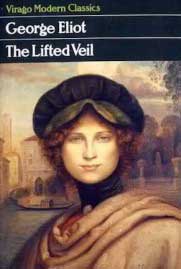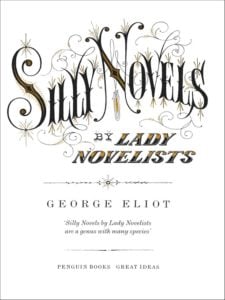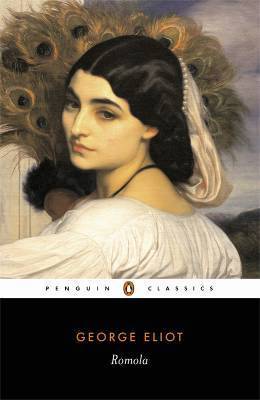The Lifted Veil by George Eliot (1859)
By Taylor Jasmine | On January 6, 2018 | Updated July 4, 2019 | Comments (2)

“I long for life, and there is no help. I thirsted for the unknown; the thirst is gone. O God, let me stay with the known, and be weary of it: I am content.” The Lifted Veil by George Eliot is an 1859 novella that departs sharply from the usual realism of the esteemed British author’s fiction. She interrupted her work on The Mill on the Floss to work on this novella.
The Lifted Veil first appeared in Blackwood Magazine in 1859, the same year that her highly regarded novel Adam Bede was published. It wasn’t published in book format until 1878 as part of a single volume with Silas Marner and Brother Jacob. The Lifted Veil wasn’t published as a stand-alone volume until 1924, more than forty years after the author’s death.
Visions of Bertha and an unreliable narrator
Latimer, the book’s unreliable narrator, is a sensitive intellectual who believes that he can see into the future and read the thoughts of others. These clairvoyant powers, in his mind, are a curse. He was struck with them after a critical childhood illness he suffered while at school in Geneva, Switzerland. Much of what he reads into the motivations of others disgusts him.
Latimer has a vision of a woman, “pale, fatal-eyed,” whom he later meets as his brother’s fiancée, Bertha Grant. He becomes smitten with her, though she’s cold and coquettish. Bewildered, he falls under her spell, ignoring his own the warning visions, and finds that her mind is unusually closed to him.
After his brother dies, Latimer marries Bertha. But the relationship is doomed as he begins to recognize how manipulative she is. In an odd plot twist, Charles Meunier, a scientist friend of Latimer’s, performs a blood transfusion from himself to Bertha’s maid, who has recently died. The maid briefly comes back to life to accuse Bertha of attempting to poison Latimer.
. . . . . . . . . .
You might also like:
Silly Novels by Lady Novelists by George Eliot
. . . . . . . . . .
Themes of The Lifted Veil
Latimer mirrors some of the beliefs George Eliot, including the repulsion at how selfish and self-interested human nature can be. On the other hand, he’s somewhat naïve, and considered one of her most unlikable characters. Beautiful, narcissistic Bertha has been compared to Rosamund Vincy of Middlemarch.
Though George Eliot’s other works of fiction were characterized by realism, she was interested in the pseudosciences of her time, including clairvoyance (AKA extrasensory perception), mesmerism, and phrenology. She seems to have poured all of those interests into this slim volume.
While a modern reading of this story might render a reanimation by blood transfusion rather simplistic, this plot detail is handled with great skill. Descriptions of Latimer’s visions are also handled with great stylistic detail.
It’s the only one of Eliot’s fictional works to be told in the form of first person. What it does have in common with her other works of fiction is its use of moralizing and psychological insight.
. . . . . . . . . .
See also: Romola by George Eliot (1862)
. . . . . . . . . .
Embarrassed its original publisher
According to the 1985 Penguin Books edition: “Reminiscent of the work of Mary Shelley, The Lifted Veil embarrassed its original publishers by its exploration of pseudosciences and its publication was delayed … A chilling tale of moral alienation and despair, this lesser-known novella testifies to Eliot’s lifelong interest in the supernatural.”
It was the first and only of George Eliot’s works to delve into the genre of science fiction; this novella might also be considered horror and makes much use of suspense.
Along with Mary Shelley’s Frankenstein (1818) , it could be placed within the Victorian horror story canon, which includes The Strange Case of Dr. Jekyll and Mr. Hyde by Robert Louis Stevenson (1886) and Dracula by Bram Stoker (1897).
. . . . . . . . . .
The Lifted Veil by George Eliot on Amazon
. . . . . . . . . .
How The Lifted Veil begins …
Chapter One
The time of my end approaches. I have lately been subject to attacks of angina pectoris; and in the ordinary course of things, my physician tells me, I may fairly hope that my life will not be protracted many months.
Unless, then, I am cursed with an exceptional physical constitution, as I am cursed with an exceptional mental character, I shall not much longer groan under the wearisome burthen of this earthly existence. If it were to be otherwise—if I were to live on to the age most men desire and provide for—I should for once have known whether the miseries of delusive expectation can outweigh the miseries of true provision. For I foresee when I shall die, and everything that will happen in my last moments.
Just a month from this day, on September 20, 1850, I shall be sitting in this chair, in this study, at ten o’clock at night, longing to die, weary of incessant insight and foresight, without delusions and without hope.
Just as I am watching a tongue of blue flame rising in the fire, and my lamp is burning low, the horrible contraction will begin at my chest. I shall only have time to reach the bell, and pull it violently, before the sense of suffocation will come. No one will answer my bell. I know why. My two servants are lovers, and will have quarreled.
My housekeeper will have rushed out of the house in a fury, two hours before, hoping that Perry will believe she has gone to drown herself. Perry is alarmed at last, and is gone out after her.
The little scullery-maid is asleep on a bench: she never answers the bell; it does not wake her. The sense of suffocation increases: my lamp goes out with a horrible stench: I make a great effort, and snatch at the bell again. I long for life, and there is no help.
I thirsted for the unknown: the thirst is gone. O God, let me stay with the known, and be weary of it: I am content. Agony of pain and suffocation—and all the while the earth, the fields, the pebbly brook at the bottom of the rookery, the fresh scent after the rain, the light of the morning through my chamber-window, the warmth of the hearth after the frosty air—will darkness close over them for ever?
Darkness—darkness—no pain—nothing but darkness: but I am passing on and on through the darkness: my thought stays in the darkness, but always with a sense of moving onward . . .
. . . . . . . . . .
More about The Lifted Veil by George Eliot
- Wikipedia
- The Lifted Veil Critical Essay on eNotes
- Review of The Lifted Veil
- Full text on Project Gutenberg
- Listen to The Lifted Veil on Librivox
. . . . . . . . . .
*This post contains affiliate links. If the product is purchased by linking through, Literary Ladies Guide receives a modest commission, which helps maintain our site and helps it to continue growing!



This is one of the most brilliant books (novella) I have ever read. It is powerfully written, like the Brontes’ works and like all fiction that I admire. It ranks as one of my favourite books of all time. I feel for Latimer, because his gift of foresight is a curse. I would hate to be burdened with such an ability; imagine being able to foresee and predict your own death – what a nightmare. I think George Eliot was one of the most brilliant and fascinating women who ever lived. At the end of her life, in the last year, she married John Walter Cross, before she died. (after G H Lewes’ death, her common law husband).
Thank you so much for this insightful comment! I’m about to start reading Silas Marner, which seems to be of an entirely different genre, though also under the general umbrella of George Eliot’s brilliance …